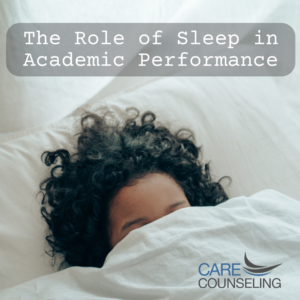The Role of Sleep in Academic Performance
 As the back-to-school season approaches, parents, students, and educators are preparing for a successful academic year. While studying, attending classes, and completing assignments are essential components of academic achievement, one critical aspect often overlooked is sleep. Adequate sleep plays a significant role in a student’s cognitive function, memory consolidation, and overall academic performance. Let’s delve into the vital connection between sleep and academic success and provide valuable tips for cultivating healthy sleep habits.
As the back-to-school season approaches, parents, students, and educators are preparing for a successful academic year. While studying, attending classes, and completing assignments are essential components of academic achievement, one critical aspect often overlooked is sleep. Adequate sleep plays a significant role in a student’s cognitive function, memory consolidation, and overall academic performance. Let’s delve into the vital connection between sleep and academic success and provide valuable tips for cultivating healthy sleep habits.
The Importance of Sleep for Academic Performance:
Quality sleep is not just essential for physical health; it is equally vital for optimal brain function. During sleep, the brain processes and consolidates the information learned during the day, strengthening memory and improving learning retention. When students experience sleep deprivation, their cognitive abilities, attention span, and problem-solving skills may be compromised, hindering their ability to perform well academically.
- Establish a Consistent Sleep Schedule:
One of the most effective ways to promote healthy sleep habits is to establish a consistent sleep schedule. Encourage your child to go to bed and wake up at the same time every day, even on weekends. A regular sleep routine helps regulate the body’s internal clock, ensuring better sleep quality and overall well-being.
- Create a Relaxing Bedtime Routine:
Establish a calming bedtime routine to signal to the body that it is time to wind down and prepare for sleep. Activities like reading a book, taking a warm bath, or practicing relaxation techniques can help ease the transition from wakefulness to sleep.
- Limit Screen Time Before Bed:
The blue light emitted by electronic devices can disrupt the production of melatonin, a hormone that regulates sleep-wake cycles. Encourage your child to limit screen time at least an hour before bedtime to promote better sleep.
- Create a Sleep-Conducive Environment:
Design a sleep-friendly environment that is cool, dark, and quiet. Investing in a comfortable mattress and pillows can also enhance sleep quality and ensure a restful night’s sleep.
- Limit Caffeine and Heavy Meals:
Caffeine and heavy meals close to bedtime can interfere with falling asleep. Encourage your child to avoid caffeine-containing beverages and heavy, greasy foods in the evening.
- Encourage Physical Activity:
Regular physical activity can improve sleep quality and overall well-being. Encourage your child to engage in moderate exercise during the day, but avoid vigorous workouts close to bedtime.
- Teach Stress Management Techniques:
Stress and anxiety can disrupt sleep patterns. Teach your child stress management techniques such as mindfulness, deep breathing, or journaling to help them cope with academic pressures effectively.
- Set a Cut-Off Time for Homework:
Encourage your child to complete their homework at least an hour before bedtime. This allows the brain to unwind and transition into a relaxed state conducive to sleep.
- Monitor Sleep Patterns:
Keep an eye on your child’s sleep patterns and duration. If you notice consistent sleep difficulties or excessive daytime sleepiness, consider consulting a healthcare professional or sleep specialist for further evaluation.
Sleep is a fundamental pillar of academic success. By prioritizing healthy sleep habits, parents can provide their children with the tools they need to excel in their studies and overall well-being. Encourage a consistent sleep schedule, create a sleep-conducive environment, and promote relaxation techniques to ensure your child gets the restorative sleep they need. Remember, a well-rested mind is a sharper mind, capable of absorbing knowledge, performing well in school, and achieving academic excellence.



























